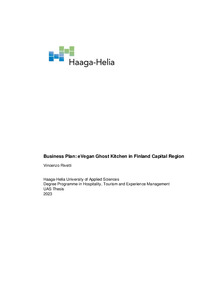Business Plan: eVegan Ghost Kitchen in Finland Capital Region
Rivetti, Vincenzo (2023)
Rivetti, Vincenzo
2023
All rights reserved. This publication is copyrighted. You may download, display and print it for Your own personal use. Commercial use is prohibited.
Julkaisun pysyvä osoite on
https://urn.fi/URN:NBN:fi:amk-2023120233636
https://urn.fi/URN:NBN:fi:amk-2023120233636
Tiivistelmä
The following thesis aims to produce a viable business plan targeting vegan customer in the Capital Region of Finland, using the Ghost Kitchens business model, resulting in filling a gap as there is no identical business in the selected area.
The implementation aims to accentuate vegans as still current trends; highlight the efficiency of digital technologies in business operations; improve the availability of vegan foods for target customers; and constitute a significant need for the author in terms of personal and professional development.
The qualitative research method of ethnographic observation was chosen as a research development process to understand the phenomenon and analyse competitors, identifying them to obtain data to create a benchmarking analysis, considering being impartial, critical, and objective. The method provided the opportunity to identify overall competitor and customer markets, as well as trends and gaps that needed to be filled or improved.
The thesis consists of two complementary parts: the theoretical research of the topics and the description of the implementation of how the result was produced with discussion and further suggestions; and the result of the product of the practical business plan, attached in the appendix. Furthermore, the delimitation excludes elements extraneous to this business concept.
The theoretical part is based on primary and secondary sources on the topic of vegans and ghost kitchens, as well as on the creation of business plans. The business plan develops both from the research of the theoretical framework and from the elements of a business plan.
The business plan assumes the formation of a limited liability company by shareholders equity and aims to demonstrate that it has a high probability of becoming a successful company reaching only 1% of the vegan population of the Capital Region. Moreover, it includes a factor that not all business can have, which is to make competitors a strength force of the company growth.
In developing the thesis, as well as the practical business plan, it seemed increasingly credible if the business plan would be put into practice. Additionally, the progression of implementation was beneficial for the author as it improved skills such as self-discipline, self-motivation, critical ability, analytical thinking, objectivity, and time management.
The timeline for implementing the thesis was scheduled to begin from June to finish by August 15, 2023, with topic brainstorming starting in early 2023. The theoretical framework was started ahead of the planned schedule for a total of seven to eight months to complete the entire thesis.
The implementation aims to accentuate vegans as still current trends; highlight the efficiency of digital technologies in business operations; improve the availability of vegan foods for target customers; and constitute a significant need for the author in terms of personal and professional development.
The qualitative research method of ethnographic observation was chosen as a research development process to understand the phenomenon and analyse competitors, identifying them to obtain data to create a benchmarking analysis, considering being impartial, critical, and objective. The method provided the opportunity to identify overall competitor and customer markets, as well as trends and gaps that needed to be filled or improved.
The thesis consists of two complementary parts: the theoretical research of the topics and the description of the implementation of how the result was produced with discussion and further suggestions; and the result of the product of the practical business plan, attached in the appendix. Furthermore, the delimitation excludes elements extraneous to this business concept.
The theoretical part is based on primary and secondary sources on the topic of vegans and ghost kitchens, as well as on the creation of business plans. The business plan develops both from the research of the theoretical framework and from the elements of a business plan.
The business plan assumes the formation of a limited liability company by shareholders equity and aims to demonstrate that it has a high probability of becoming a successful company reaching only 1% of the vegan population of the Capital Region. Moreover, it includes a factor that not all business can have, which is to make competitors a strength force of the company growth.
In developing the thesis, as well as the practical business plan, it seemed increasingly credible if the business plan would be put into practice. Additionally, the progression of implementation was beneficial for the author as it improved skills such as self-discipline, self-motivation, critical ability, analytical thinking, objectivity, and time management.
The timeline for implementing the thesis was scheduled to begin from June to finish by August 15, 2023, with topic brainstorming starting in early 2023. The theoretical framework was started ahead of the planned schedule for a total of seven to eight months to complete the entire thesis.
